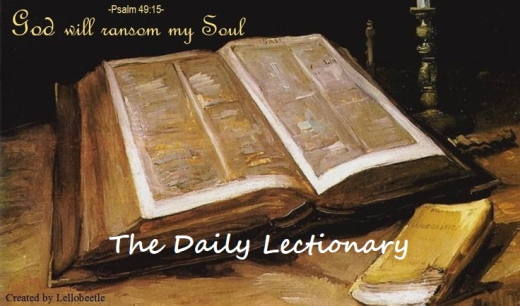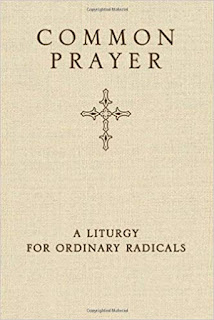The Daily Lectionary
MONDAY, July 13, 2020
Psalm 142; Micah 1:1-5; 1 Thessalonians 4:1-8
(Revised Common Lectionary Year A)
God my refuge and portion
1 I cry aloud to the Lord;
I lift up my voice to the Lord for mercy.
2 I pour out before him my complaint;
before him I tell my trouble.
3 When my spirit grows faint within me,
it is you who watch over my way.
In the path where I walk
people have hidden a snare for me.
4 Look and see, there is no one at my right hand;
no one is concerned for me.
I have no refuge;
no one cares for my life.
5 I cry to you, Lord;
I say, “You are my refuge,
my portion in the land of the living.”
6 Listen to my cry,
for I am in desperate need;
rescue me from those who pursue me,
for they are too strong for me.
7 Set me free from my prison,
that I may praise your name.
Then the righteous will gather about me
because of your goodness to me.
Judgment for Jacob’s transgression
1:1 The word of the Lord that came to Micah of Moresheth during the reigns of Jotham, Ahaz and Hezekiah, kings of Judah—the vision he saw concerning Samaria and Jerusalem.
2 Hear, you peoples, all of you,
listen, earth and all who live in it,
that the Sovereign Lord may bear witness against you,
the Lord from his holy temple.
3 Look! The Lord is coming from his dwelling place;
he comes down and treads on the heights of the earth.
4 The mountains melt beneath him
and the valleys split apart,
like wax before the fire,
like water rushing down a slope.
5 All this is because of Jacob’s transgression,
because of the sins of the people of Israel.
What is Jacob’s transgression?
Is it not Samaria?
What is Judah’s high place?
Is it not Jerusalem?
A life pleasing to God
4:1 As for other matters, brothers and sisters, we instructed you how to live in order to please God, as in fact you are living. Now we ask you and urge you in the Lord Jesus to do this more and more. 2 For you know what instructions we gave you by the authority of the Lord Jesus.
3 It is God’s will that you should be sanctified: that you should avoid sexual immorality; 4 that each of you should learn to control your own body in a way that is holy and honorable, 5 not in passionate lust like the pagans, who do not know God; 6 and that in this matter no one should wrong or take advantage of a brother or sister. The Lord will punish all those who commit such sins, as we told you and warned you before. 7 For God did not call us to be impure, but to live a holy life. 8 Therefore, anyone who rejects this instruction does not reject a human being but God, the very God who gives you his Holy Spirit.
Optional parts of the readings are set off in [square brackets.]The Daily Lectionary for MONDAY, July 13, 2020
The Bible texts of the Old Testament, Epistle, and Gospel lessons are from The Holy Bible, New International Version®, NIV® Copyright ©1973, 1978, 1984, 2011 by Biblica, Inc.® Used by permission. All rights reserved worldwide.
The Daily Lectionary is a three-year cyclical lectionary. We are currently in Year A. Beginning with the first Sunday of Advent in 2020, we will be in Year B. The year which ended at Advent 2019 was Year C. These readings complement the Sunday and festival readings: Thursday through Saturday readings help prepare the reader for the Sunday ahead; Monday through Wednesday readings help the reader reflect and digest what they heard in worship. Revised Common Lectionary Daily Readings, copyright © 2005 Consultation on Common Texts. www.commontexts.org
Psalm 142; Micah 1:1-5; 1 Thessalonians 4:1-8









